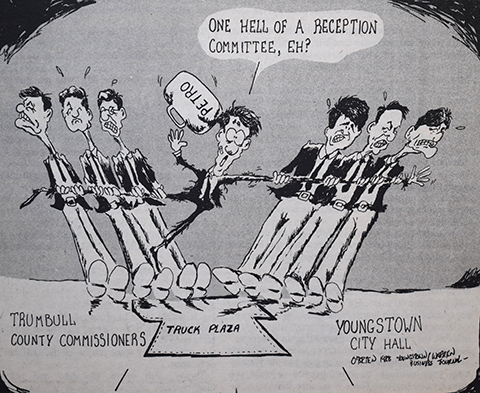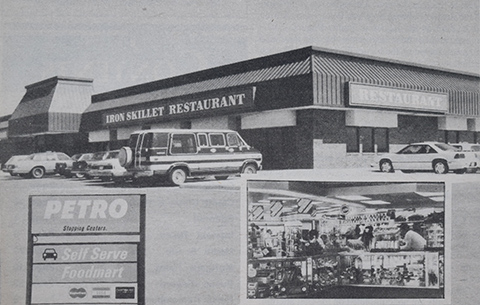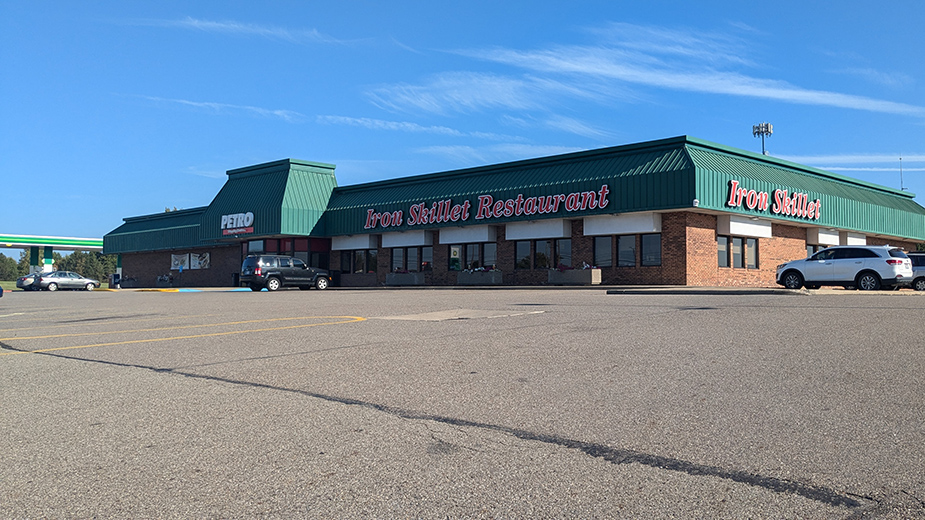GIRARD – The Petro Travel Center in Girard has served motorists from over-the-road truckers to drivers of passenger vehicles since it opened in May 1990, and now is surrounded by similar fueling stations serving commercial and noncommercial customers.
But it almost didn’t happen as parochial politics nearly derailed what was in 1988 described as a $6.5 million project.
The site, at I-80 and Salt Springs Road, is part of TravelCenters of America, which purchased Petro in 2007. It is one of more than 300 such centers that TravelCenters – purchased by BP last year – operates in 44 states. Today it employs 100 area residents.
Coverage of the project began in the MidApril 1988 edition of what was then the Youngstown/Warren Business Journal. Petro Stopping Centers had purchased property in Weathersfield Township to build a major truck stop. According to company vice president Travis Roberts, Petro had put five such projects into operation in the 20 months since the company had purchased the land.
The 20,000-square-foot building would offer a convenience store, full-service restaurant, laundry room and shower facilities, the company said. A separate building would offer 30-minute repair service for trucks,
Trumbull County had requested that Youngstown extend sewer service to the site, which would open that area for development. The city administration had been assured by Petro that 30% of the 150 jobs – the company’s estimate – to be created by the project would be earmarked for Youngstown residents.

Youngstown City Council wanted more, and proposed annexing the site to the city, a nonstarter for Trumbull County, which proposed developing a limited capacity package plant to supply water and sewer service.
“It won’t go on forever,” Petro’s Roberts warned, referring to political squabbling. Placing most of the blame on Trumbull County officials – who didn’t want to see Youngstown grow at Trumbull’s expense – the executive warned that his company would sell the land if no progress was made in six months.
Youngstown Mayor Patrick J. Ungaro subsequently brokered an agreement with Petro’s legal counsel, according to our June 1988 story. If the agreement was approved by City Council and company officials, the company would provide the 30% allocation of jobs for city residents as well as payment equivalent to 2% of the truck stop’s total payroll to the city in exchange for the sewer line extension.
“Annexation is obsolete; it causes too much hostility,” Ungaro said. “The turf battle is preventing development.”
Trumbull County officials responded to the deal by withholding building permits for the project and pursuing state grants to provide sewer service to the site. Our July 1988 editorial pointed to the risk that protracted confrontation could discourage future development, as Pilot Oil Co. also was looking to develop a similar project in that area.
By August 1988, Petro had received a land use permit from the Weathersfield Township Board of Zoning Appeals and building plans were being reviewed. But who would provide sewer service to the project remained undetermined. Trumbull County was seeking a $350,000 grant to fund the package sewer plant and Youngstown also was making plans.
Trumbull County Commissioner Art McGee contended that the proposed 2% payment to Youngstown was illegal and provided an incentive for annexing the property to the Mahoning County city.
Our September 1988 editorial commented on an ill-advised City Council resolution that would require any landowner seeking the extension of water or sewer lines to their property to submit to annexation or pay a cash incentive for the extension.
That was an acknowledgement of how the city had watched development go to the suburbs when past administrations extended water and sewer lines with no strings attached.
“A combative stance will not provide the answer to Youngstown’s economic development woes, nor will it facilitate regional cooperation,” we opined.
By January 1989, the $6.5 million project was on its way. Girard City Council approved a sewer contract with the county in December 1988.
Also that month, the Trumbull County Planning Commission submitted the $350,000 grant request to the Ohio Department of Development.
At long last, the truck stop opened May 7, 1990. Petro officials were ready to put the controversy behind them.
“We’re obviously just happy to be built and in operation,” said Dave Latimer, Petro director of operations. “We know that we have the support of the community and we’re proud of that.”

Local officials saw the project as just the start for the I-80 exit site. Across the road from Petro, Pilot already had started construction on another truck stop.
“There are several companies that are looking to develop out there,” then-Trumbull County Commissioner Christopher Lardis said.
Today, Pilot, Mr. Fuel, Sheetz, Dunkin’ and McDonald’s are among the fuel or food providers populating the I-680-Salt Springs intersection.
The Petro Girard travel center includes the Iron Skillet restaurant, a large convenience store, BP-branded gasoline and a pet area. It has five truck maintenance bays, emergency roadside service, 14 showers, 14 diesel lanes and a parking lot for 320 trucks.
Pictured at top: The Iron Skillet Restaurant, part of Petro Travel Center.
